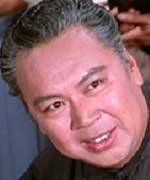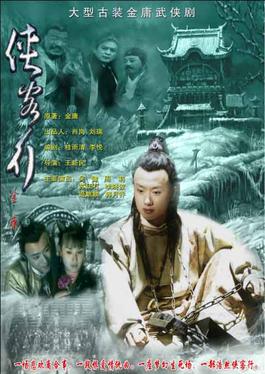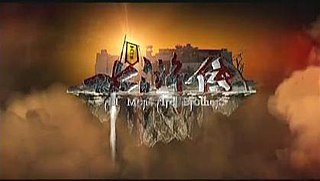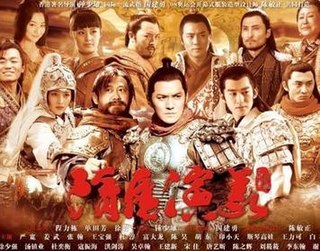Fung Fung was a veteran Hong Kong actor. He began his career as a leading man in 1946. An accident in 1949 left the left side of his face paralysed, but, while no longer able to attract leading roles, he enjoyed a long career as a character actor, appearing in films alongside such stars as Jackie Chan and Sammo Hung. He was the father of Fung Bo Bo, a child star of the 1960s, Alice Fung, a veteran actress, and Fung Hak-On, an actor known for playing villainous roles in several kung fu/action comedies of the 1970s and 1980s.

Lo Wei was a Hong Kong film director and film actor best known for launching the martial arts film careers of both Bruce Lee, in The Big Boss and Fist of Fury, and Jackie Chan, in New Fist of Fury.

Shek Wing-cheung, better known by his stage name Shih Kien, Sek Kin, or Sek Gin or Shek Kin(Chinese: 石堅; pinyin: Shí Jiān; Jyutping: Sek6 Gin1), was a Hong Kong–based Chinese actor. Shih is best known for playing antagonists and villains in several early Hong Kong wuxia and martial arts films that dated back to the black-and-white period, and is most familiar to Western audiences for his portrayal of the primary villain, Han, in the 1973 martial arts film Enter the Dragon, which starred Bruce Lee.

Walter Tso Tat-Wah was a film actor of Hong Kong, most famous for the roles he played in a number of Wuxia films in the 1950s and 1960s.

Romance of the Three Kingdoms is a Chinese television series adapted from the classical 14th century novel of the same title by Luo Guanzhong. The series was produced by China Central Television (CCTV) and was first aired on the network in 1994. It spanned a total of 84 episodes, each approximately 45 minutes long. One of the most expensive television series produced at the time, the project was completed over four years and involved over 400,000 cast and crew members, including divisions of the People's Liberation Army from the Beijing, Nanjing and Chengdu military regions. Some of the dialogues spoken by characters were adapted directly from the novel. Extensive battle scenes, such as the battles of Guandu, Red Cliffs and Xiaoting, were also live-acted.
The ranks of imperial consorts have varied over the course of Chinese history but remained important throughout owing to its importance in management of the inner court and in imperial succession, which ranked heirs according to the prominence of their mothers in addition to their strict birth order. Regardless of the age, however, it is common in English translation to simplify these hierarchy into the three ranks of Empress, consorts, and concubines. It is also common to use the term "harem", an Arabic loan word used in recent times to refer to imperial women's forbidden quarters in many countries. In later Chinese dynasties, these quarters were known as the back palace. In Chinese, the system is called the Rear Palace System.

Three Kingdoms is a 2010 Chinese television series based on the events in the late Eastern Han dynasty and the Three Kingdoms period. The plot is adapted from the 14th century historical novel Romance of the Three Kingdoms and other stories about the Three Kingdoms period. Directed by Gao Xixi, the series had a budget of over 160 million RMB and took five years of pre-production work. Shooting of the series commenced in October 2008, and it was released in China in May 2010.
Wei Ping-ao, also known as Paul Wei, was a Hong Kong-based Chinese actor who started his career in the Shaw Brothers Studio. He is best known for playing cunning interpreters in Bruce Lee's 1972 films Fist of Fury and Way of the Dragon, in which he dubbed his own voice, and also appeared in films such as Deaf Mute Heroine (1971), Hapkido (1972) and Fists of Bruce Lee (1978). He suffered from jaundice in his later years. He died on 3 December 1989 in British Hong Kong.

Dick Wei is a Taiwanese actor, director and writer who specializes in martial arts and action films.

Ode to Gallantry is a Chinese television series adapted from Louis Cha's novel of the same title. The series was first broadcast on NMTV in China in 2002.

All Men Are Brothers is a 2011 Chinese television series adapted from Shi Nai'an's 14th century novel Water Margin, one of the Four Great Classical Novels of Chinese literature. The series is directed by Kuk Kwok-leung and features cast members from mainland China, Taiwan and Hong Kong. The series was first broadcast on 8TV in March 2011 in Malaysia.

Justice Bao is a Chinese TV series starring producer Jin Chao-chun as the Song dynasty official Bao Zheng. The series ran for 3 seasons from 2010 to 2012. In addition to Jin, Kenny Ho, Fan Hung-hsuan and Lung Lung again reprise their iconic roles from the 1993 Taiwanese hit Justice Pao and the 2008 Chinese series Justice Bao.
Kwan Shan was a Hong Kong film actor. Kwan appeared as a romantic lead actor in Mandarin-language films created in Hong Kong, especially during the 1960s. His roles included several Shaw Brothers Studio productions.

Heroes in Sui and Tang Dynasties is a Chinese television series based on Chu Renhuo's historical novel Sui Tang Yanyi, which romanticises the historical events leading to the fall of the Sui dynasty and the rise of the Tang dynasty. The series was first broadcast in mainland China on various television networks on 14 January 2013. It is not to be confused with Heroes of Sui and Tang Dynasties 1 & 2, a similar television series also based on the novel, but was released earlier in December 2012. Filming for the series started on 5 November 2011 at the Hengdian World Studios and wrapped up in May 2012.
Miao Tien was a Chinese film actor mostly active in Hong Kong and Taiwan.

The Heart of Woman, also known as Women, is a Taiwanese Hokkien television series that began airing on SET Taiwan in Taiwan on 21 November 2012, from Mondays to Fridays, and ends on 21 November 2013, lasting one year with a total of 262 episodes.

Sun Yueh was a Taiwanese actor.
Fung Hak-on was a Hong Kong actor. He appears in Hong Kong films since the 1960s until mid 2010s.

Nowhere Man is a 2019 Taiwanese streaming television miniseries written, directed, and edited by Chen Yin-jung. It stars Joseph Chang, Alyssa Chia, Mavis Fan, Wang Po-chieh, Jeremiah Zhang, Zhou Ming-fu, Greg Hsu, Kuo Tzu-chien, and Lu Yi-lung. The miniseries follows a death row inmate who must break out of prison to save his kidnapped son and protect his family.













